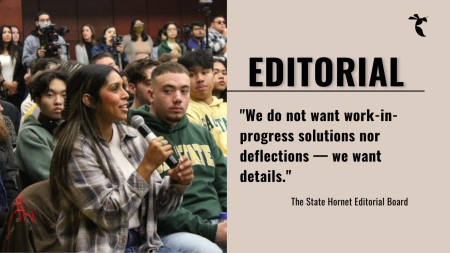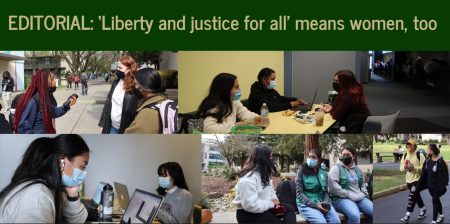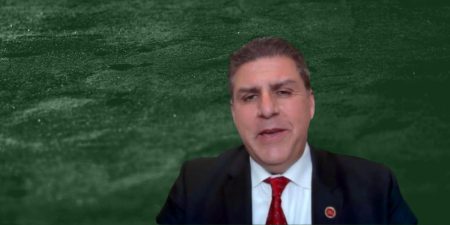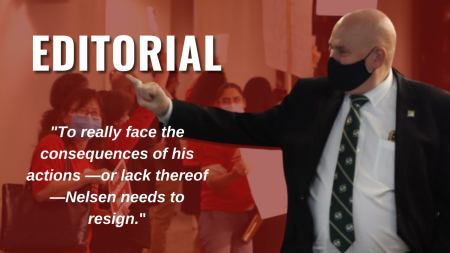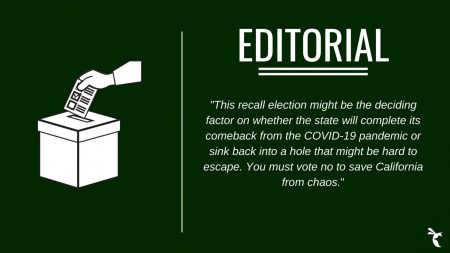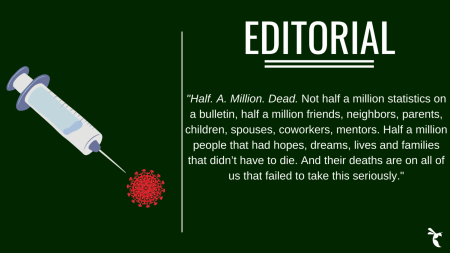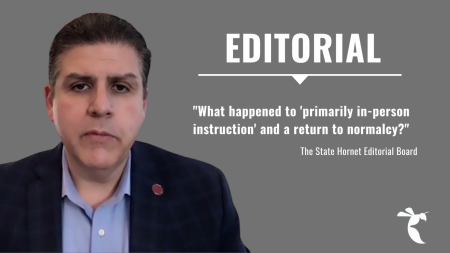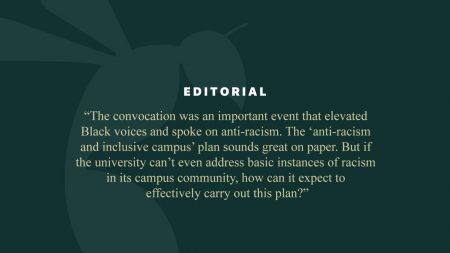EDITORIAL: Student protesters are not criminals
May 4, 2011
“Leadership starts here.” That’s the motto of Sacramento State. And yet, when students try to lead through peaceful protest, they face police officers in riot gear and possible criminal charges.
The protest, which started on April 13 and led to a three-day sit-in of Sacramento Hall, was quashed in the early morning hours of April 16, around 3 a.m. Of the original 1,500 protesters, 27 had slept in Sacramento Hall, and four were awake when police in riot gear showed up.
Yeimi Lopez, who had been the liaison between the University Police Department and the Students for Quality Education – the group that organized the protest on campus – was given no warning that the students were going to be kicked out. Lopez had been in contact with Lt. Christina Lofthouse each day of the protest, but the appearance of a San Francisco Police officer and the subsequent show of force by the riot police was a surprise, Lopez said.
Aleksander Pavlovich, who had been studying in the AIRC before being kicked out by a police officer worried that the protest would destroy computers in the building, joined the protest. A Marine with combat experience, Pavlovich said using the riot police was going overboard.
“There’s a calculated level of force,” he said. “The flak jackets and helmets meant they were ready for a certain level of violence.”
He went on to say this could have the effect of causing that violence, escalating the situation when it did not need to be.
All of this for a peaceful protest about tuition rising. Now, four students, dubbed the “Sac State Four,” are facing disciplinary hearings. Lopez, Nora Walker, Amanda Mooers and Mildred Gomez-Garcia are being charged with – wait for it – camping illegally.
While it is illegal and thus a crime, is it really worth it to charge the students with camping without an ordinance? The protest, quite frankly, needed to happen, seeing as tuition keeps getting higher each semester. It’s something the administration needed to see – students finally standing up for what they believe in. And the administration didn’t even have the common courtesy of warning the protesters that it could result in them getting kicked out of the building and they could face criminal charges.
Is that not the most pathetic thing you have ever heard? A protest, one that even met with Sac State President Alexander Gonzalez four times, said Mooers, or three times, according to a press release by Gonzalez, was shut down on charges of camping illegally. And by police in riot gear, to boot. The meetings? Gonzalez shot down the four main points the protesters were trying to get out, including support of two legislative bills and freezing pay raises, Mooers said.
The administration, while admitting they were scared of so many people being in the building, protester Lindsay Curtis said, took no action for the first two nights. When the weekend came, when there would be no air conditioning, things changed. The doors to the building were also closed and locked, meaning there would be no airflow. The students were cut off from both food and air circulation.
Speaking of police, Kevin Wehr, sociology professor and president of the local California Faculty Association chapter, said the school lost an estimated $14,000 to pay for the overtime of the police; something, he said, that was not needed. The protest really only needed a few officers there, and did not need riot police to kick them out, Wehr said. This would have significantly driven the cost down.
A week after the protest on our campus, there was a similar protest at CSU Fullerton. Except, instead of students being charged with crimes, the president of the university signed a resolution in cooperation with the students. Meanwhile, Gonzalez told the protesters that in regards to the budget, “Next semester will be bloody,” Mooers said.
While the students at Fullerton celebrate, the “Sac State Four” are being charged with a pointless crime while protesting on a college campus, a slap in the face of student protesting. The Four are not, however, without important backing. Members of the faculty, students, and even Assemblymembers Anthony Portantino and Richard Pan, as well as state Sen. Leland Yee, have expressed their support of the protest and the Four. Portantino came to campus and spoke with the protesters, while Yee spoke with them on the phone, and expressed that he wished he could have been on campus protesting with them, Wehr said.
Inquiries to Gonzalez’ office were met with his April 18 press release.
The injustice of what is happening to the “Sac State Four” will not go unnoticed.
The opinion staff can be reached at [email protected].

































































































































